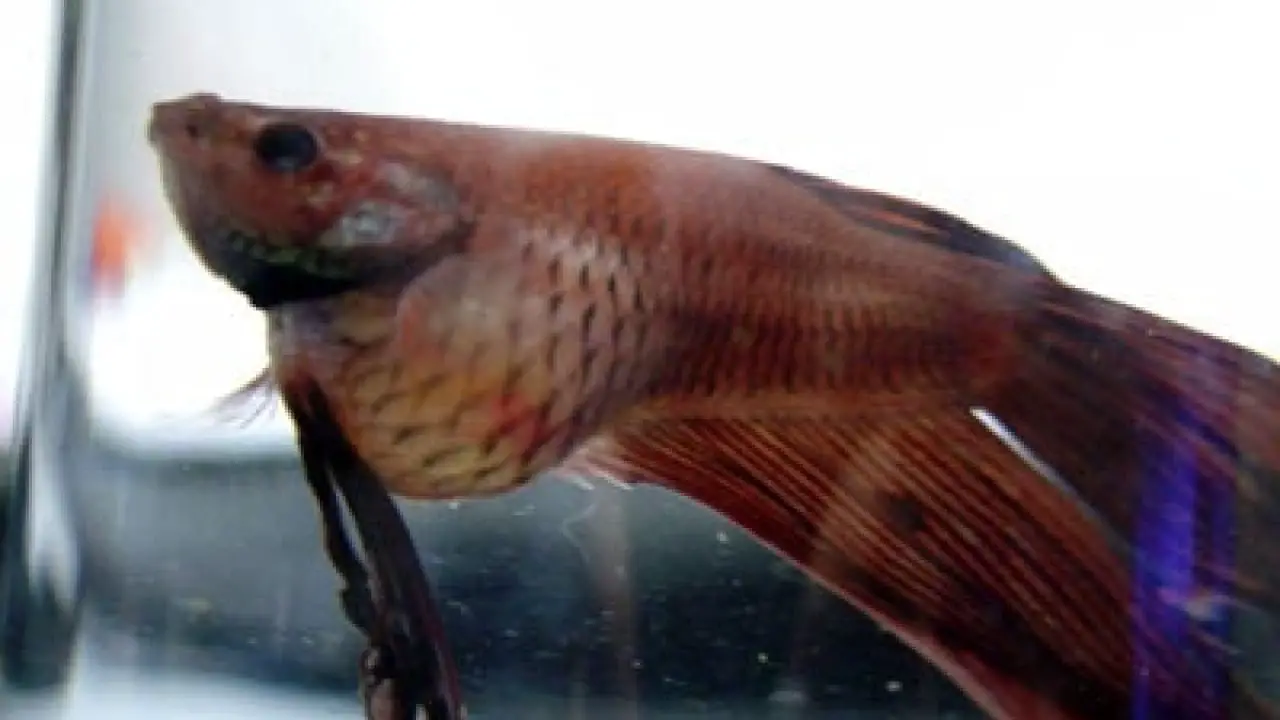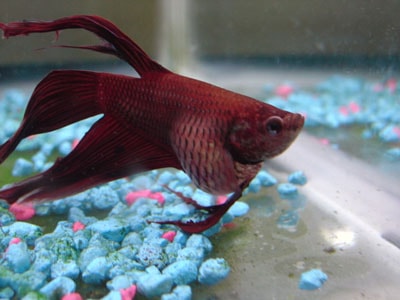Betta fish are one of the most popular fish species for pet owners. They are beautiful and easy to take care of, which makes them ideal for both novice and experienced fish keepers. However, if you notice that your Betta fish has a big belly, it could be a sign of a serious health issue.
A bloated Betta fish can be caused by various reasons, including overfeeding, constipation, or even disease. In this article, we will discuss how to identify and address this issue to ensure that your Betta fish stays healthy and happy. So, read on to learn more about how to take care of your Betta fish and keep them in excellent condition.

Identifying and Addressing Betta Fish with a Big Belly
Betta fish are a popular aquarium pet that are known for their vibrant colors and unique personalities. However, sometimes betta fish can develop a big belly, which can be a sign of an underlying health issue. In this article, we will explore the causes and solutions for betta fish with a big belly.
Causes of Betta Fish with a Big Belly
Betta fish can develop a big belly for a variety of reasons. One common cause is overfeeding. Betta fish are known to have large appetites and can easily become overweight if they are given too much food. Another cause of a big belly in betta fish is constipation. This can occur when betta fish are not getting enough fiber in their diet or if they have ingested something that is causing a blockage in their digestive system.
Overfeeding
Overfeeding is a common cause of a big belly in betta fish. It is important to only feed your betta fish the recommended amount of food for their size and age. Overfeeding can lead to obesity, which can cause a variety of health problems for your fish. To prevent overfeeding, it is recommended to feed your betta fish small amounts of food two to three times a day.
Constipation
Constipation is another common cause of a big belly in betta fish. This can occur when betta fish are not getting enough fiber in their diet or if they have ingested something that is causing a blockage in their digestive system. Symptoms of constipation in betta fish include a bloated belly, difficulty swimming, and a lack of appetite.
Solutions for Betta Fish with a Big Belly
If your betta fish has a big belly, there are several solutions that you can try. The first step is to identify the cause of the problem. If your betta fish is overfed, reducing the amount of food that you are feeding them can help to alleviate the problem. If your betta fish is constipated, there are several remedies that you can try.
Moving to a High-Fiber Diet
One solution for constipation in betta fish is to move to a high-fiber diet. This can help to regulate their digestive system and prevent blockages. Foods such as peas, spinach, and zucchini are all good sources of fiber for betta fish.
Using Epsom Salt
Another solution for constipation in betta fish is to use Epsom salt. This can help to relieve the blockage in their digestive system and promote regular bowel movements. To use Epsom salt, add 1/8th of a teaspoon to a gallon of water and soak your betta fish in the solution for 10 to 15 minutes.
Feeding Live Food
Feeding live food can also help to alleviate constipation in betta fish. Live food such as brine shrimp or daphnia can help to stimulate their digestive system and promote regular bowel movements.
Benefits of a Healthy Betta Fish
Keeping your betta fish healthy is important for their overall well-being. A healthy betta fish will have a vibrant color, a strong appetite, and will be active in their environment. By identifying and addressing any health issues that your betta fish may have, you can help to ensure that they live a long and happy life.
Healthy Betta Fish Vs Unhealthy Betta Fish
A healthy betta fish will have a full and rounded belly, while an unhealthy betta fish may have a bloated or sunken belly. A healthy betta fish will also be active and alert, while an unhealthy betta fish may be lethargic and may not have a strong appetite.
Conclusion
In conclusion, betta fish with a big belly can be a sign of an underlying health issue. By identifying the cause of the problem and implementing the appropriate solutions, you can help to alleviate any health issues that your betta fish may have. Keeping your betta fish healthy is important for their overall well-being, and by following these tips, you can help to ensure that they live a long and happy life.
Frequently Asked Questions
What causes a Betta fish to have a big belly?
Betta fish may have a big belly due to overfeeding, constipation, or a health issue. Overfeeding can cause the fish to consume more food than necessary, leading to bloating. Constipation can occur when the fish is not able to digest its food properly, causing a buildup of waste in the digestive tract. Health issues such as tumors or organ failure can also cause a Betta fish to have a big belly.
In order to determine the cause of the big belly, it is important to observe the fish’s behavior and consult with a veterinarian if necessary. Adjusting the feeding schedule and offering a varied diet can help prevent overfeeding and constipation. Providing a clean and healthy environment can also promote overall health and prevent health issues.
How can I tell if my Betta fish has a big belly?
A Betta fish with a big belly may have a rounded or swollen appearance. The belly may appear larger than usual and the fish may have difficulty swimming or floating properly. The fish may also exhibit signs of discomfort such as rubbing against objects or hiding in corners.
Regular observation of the fish’s behavior and appearance can help identify any changes or abnormalities. It is important to address any issues as soon as possible to prevent further health complications.
What are some remedies for a Betta fish with a big belly?
If the Betta fish has a big belly due to overfeeding or constipation, reducing the amount of food and offering a varied diet can help alleviate the issue. It is important to avoid feeding the fish too much at once and to provide a balanced diet that includes protein and fiber.
If the big belly is due to a health issue, consulting with a veterinarian is recommended. Treatment may involve medication or surgery depending on the underlying condition.
Maintaining a clean and healthy environment is also important for promoting overall health and preventing health issues. Regular water changes and proper filtration can help prevent bacterial or fungal infections that may contribute to a big belly.
Can a Betta fish die from having a big belly?
Yes, a Betta fish can die from having a big belly if the issue is not addressed in a timely manner. Overfeeding and constipation can lead to digestive issues and organ failure if left untreated. Health issues such as tumors or organ failure can also be life-threatening.
Regular observation and addressing any changes or abnormalities can help prevent health complications and promote overall health. Consulting with a veterinarian is recommended if there are any concerns about the fish’s health.
How can I prevent my Betta fish from getting a big belly?
Preventing overfeeding and constipation is key to preventing a big belly in Betta fish. Offering a balanced diet that includes protein and fiber and feeding in small amounts can help prevent overfeeding. Soaking food pellets in water before feeding can also help prevent constipation.
Maintaining a clean and healthy environment is also important for preventing health issues. Regular water changes and proper filtration can help prevent bacterial or fungal infections that may contribute to a big belly. Observing the fish’s behavior and appearance regularly can help identify any changes or abnormalities and address them before they become a bigger issue.

5 Things I Wish I Knew BEFORE I Got My First Betta Fish
In conclusion, identifying and addressing a Betta fish with a big belly is crucial for its overall health and well-being. It is important to properly diagnose the cause of the bloating and take necessary actions to treat it.
One key way to prevent bloating in Betta fish is to maintain a clean aquarium and provide a healthy diet. Overfeeding or feeding the wrong type of food can lead to digestive issues and bloating.
If your Betta fish does develop a big belly, it is important to act quickly and seek advice from a veterinarian or experienced fishkeeper. With proper care and attention, your Betta fish can recover and thrive. Remember, a healthy Betta is a happy Betta!
